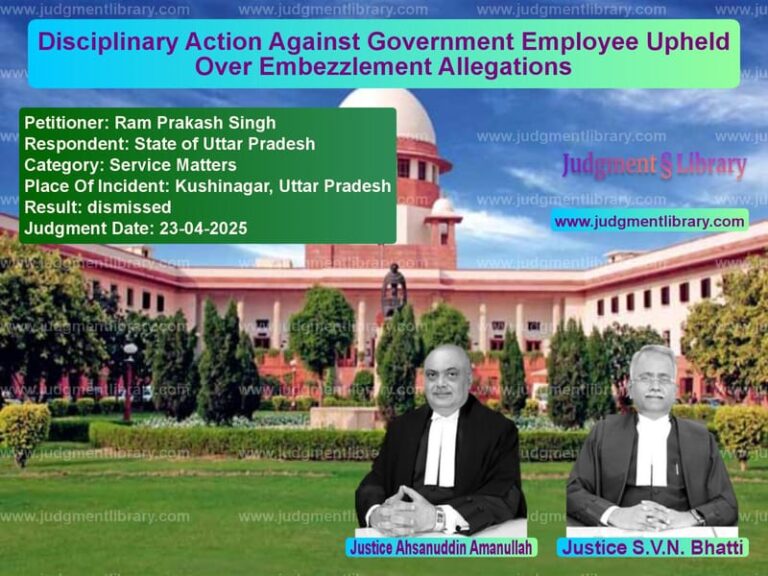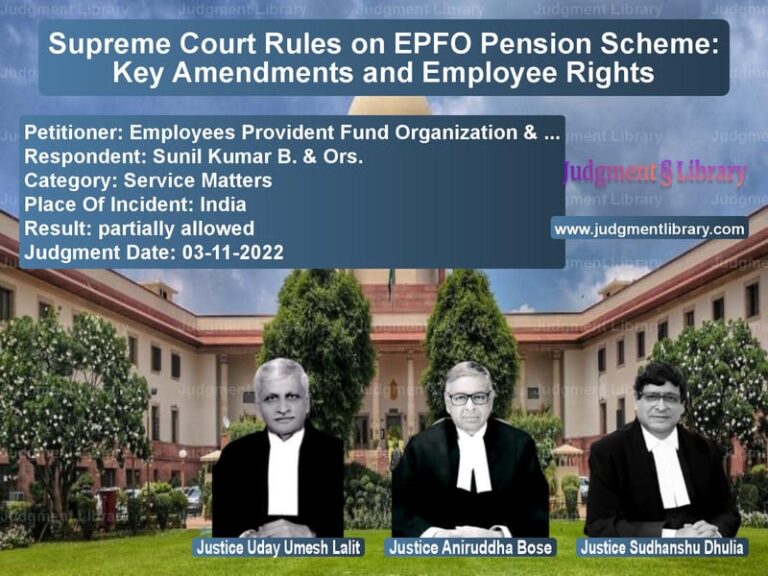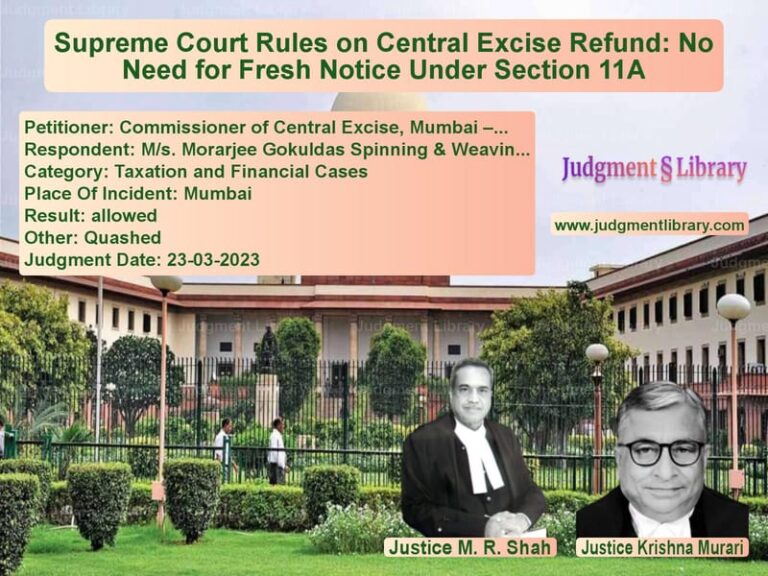CBI’s 17-Year Freeze on Foreign Investor’s Funds Overturned: Jermyn Capital vs. CBI
The case of M/s. Jermyn Capital LLC Dubai vs. Central Bureau of Investigation (CBI) is a crucial ruling that underscores the principles of due process and the protection of property rights for foreign investors. The Supreme Court of India overturned a 17-year freeze order on the financial assets of Jermyn Capital, which was imposed by the CBI as part of an investigation unrelated to the company itself.
This case highlights significant legal questions regarding the misuse of investigative powers, the right to property, and the unjust imposition of financial restrictions on entities that are not directly involved in any criminal proceedings. The Supreme Court, after reviewing the case, concluded that the freeze order and the requirement to furnish a bank guarantee were legally untenable and ordered the immediate release of the funds.
Background of the Case
The dispute began when Jermyn Capital LLC, a foreign institutional investor (FII) approved by the Securities and Exchange Board of India (SEBI), faced a freeze order on its assets due to an investigation against one Dharmesh Doshi, who was never associated with the company in any capacity.
Key events in the case include:
- Jermyn Capital was operating in the Indian stock market under SEBI regulations.
- Due to legal proceedings, the company ceased trading in 2006 but retained its funds and securities in an ICICI Bank account.
- The CBI issued a freeze order on 20.10.2006, preventing the company from repatriating its funds.
- A second freeze order was issued on 17.08.2010, further restricting access to ₹38.52 crores, even though the Supreme Court had previously allowed Jermyn Capital to repatriate ₹42.51 crores without a bank guarantee.
- The company approached the Trial Court, which in 2012 allowed repatriation but imposed a condition requiring a bank guarantee equivalent to the amount being withdrawn.
- Jermyn Capital challenged this condition in the Gujarat High Court, which upheld the bank guarantee requirement in 2018.
- The case was then escalated to the Supreme Court.
Petitioners’ Arguments
Jermyn Capital presented the following key arguments before the Supreme Court:
- The freeze order and bank guarantee condition were unjustified, as the company was never named in any FIR or charge sheet related to the case.
- The entire investigation was centered around an individual, Dharmesh Doshi, who was not an employee, director, shareholder, or key managerial person of Jermyn Capital.
- Since Doshi had been discharged from all allegations, there was no legal basis to continue the freeze order on Jermyn Capital’s assets.
- The prolonged freeze had caused severe financial losses and undue hardship to the company for 17 years.
- The CBI had no valid reason to restrict a foreign institutional investor’s funds, particularly when it had already allowed repatriation of a larger sum (₹42.51 crores) in 2006.
Respondents’ Arguments
The CBI defended its actions by arguing:
- The freeze orders were issued in the interest of the investigation and national financial security.
- At the time of imposing the freeze, it was suspected that Jermyn Capital might be connected to the alleged financial irregularities involving Doshi.
- Even though Doshi was discharged, there was a possibility of future proceedings, and the freeze order was necessary to ensure compliance.
- The requirement of a bank guarantee was a precautionary measure to safeguard public interest.
Supreme Court’s Analysis
The Supreme Court carefully examined the facts and legal aspects of the case and concluded that the CBI’s actions were legally untenable. The key observations of the Court were:
1. No Legal Basis for the Freeze Order
The Court ruled:
“Since the said Dharmesh Doshi was in no way connected to the appellant company herein, the trial faced by him was in his individual capacity, and not vicariously on behalf of the appellant company.”
Thus, there was no justification for extending the freeze order on Jermyn Capital’s assets.
2. Violation of Property Rights
The Court emphasized that Jermyn Capital was not named in any FIR or charge sheet and that freezing its assets for 17 years was a gross violation of property rights. It stated:
“Since the appellant company is not connected to the alleged crime, and has not found mention in the FIR or the charge sheet, the freeze order against the appellant company’s properties is redundant.”
3. Excessive Delay and Financial Harm
The Court acknowledged the severe financial impact of the prolonged freeze:
“The operation of the freeze order has been active for a period of 17 years and has caused huge losses to the appellant company.”
It ruled that such financial restrictions should only be imposed when necessary for ongoing investigations, which was not the case here.
Final Verdict and Directions
After thorough deliberation, the Supreme Court ruled:
- The freeze order is quashed, and all financial restrictions on Jermyn Capital are lifted.
- The bank guarantee condition imposed by the lower courts is removed.
- The company is allowed to withdraw ₹38.52 crores along with 4% simple interest from 08.05.2006 until the date of actual payment.
- The CBI has no authority to impose further restrictions on the company’s assets in relation to this case.
Implications of the Judgment
The Supreme Court’s decision has major implications for financial regulations, property rights, and law enforcement practices:
- Protects foreign investors: This ruling reaffirms that foreign institutional investors cannot be arbitrarily subjected to financial restrictions without proper legal justification.
- Strengthens due process: Investigative agencies must establish clear legal grounds before imposing financial restrictions on companies or individuals.
- Prevents misuse of investigative powers: The Court set a precedent that freeze orders must be periodically reviewed and lifted if they are no longer justified.
- Ensures compensation for unjust financial restrictions: The Court’s directive to provide 4% interest recognizes the financial damage caused by unlawful freezes.
By quashing the unjust freeze order, the Supreme Court has reaffirmed the principles of justice, fairness, and the protection of investor rights, ensuring that companies are not penalized for unrelated criminal investigations.
Petitioner Name: M/s. Jermyn Capital LLC Dubai.Respondent Name: Central Bureau of Investigation & Ors..Judgment By: Justice Krishna Murari, Justice Sanjay Kumar.Place Of Incident: India.Judgment Date: 09-05-2023.
Don’t miss out on the full details! Download the complete judgment in PDF format below and gain valuable insights instantly!
Download Judgment: ms.-jermyn-capital-vs-central-bureau-of-in-supreme-court-of-india-judgment-dated-09-05-2023.pdf
Directly Download Judgment: Directly download this Judgment
See all petitions in Banking Regulations
See all petitions in Corporate Compliance
See all petitions in unfair trade practices
See all petitions in Judgment by Krishna Murari
See all petitions in Judgment by Sanjay Kumar
See all petitions in allowed
See all petitions in Quashed
See all petitions in supreme court of India judgments May 2023
See all petitions in 2023 judgments
See all posts in Corporate and Commercial Cases Category
See all allowed petitions in Corporate and Commercial Cases Category
See all Dismissed petitions in Corporate and Commercial Cases Category
See all partially allowed petitions in Corporate and Commercial Cases Category







